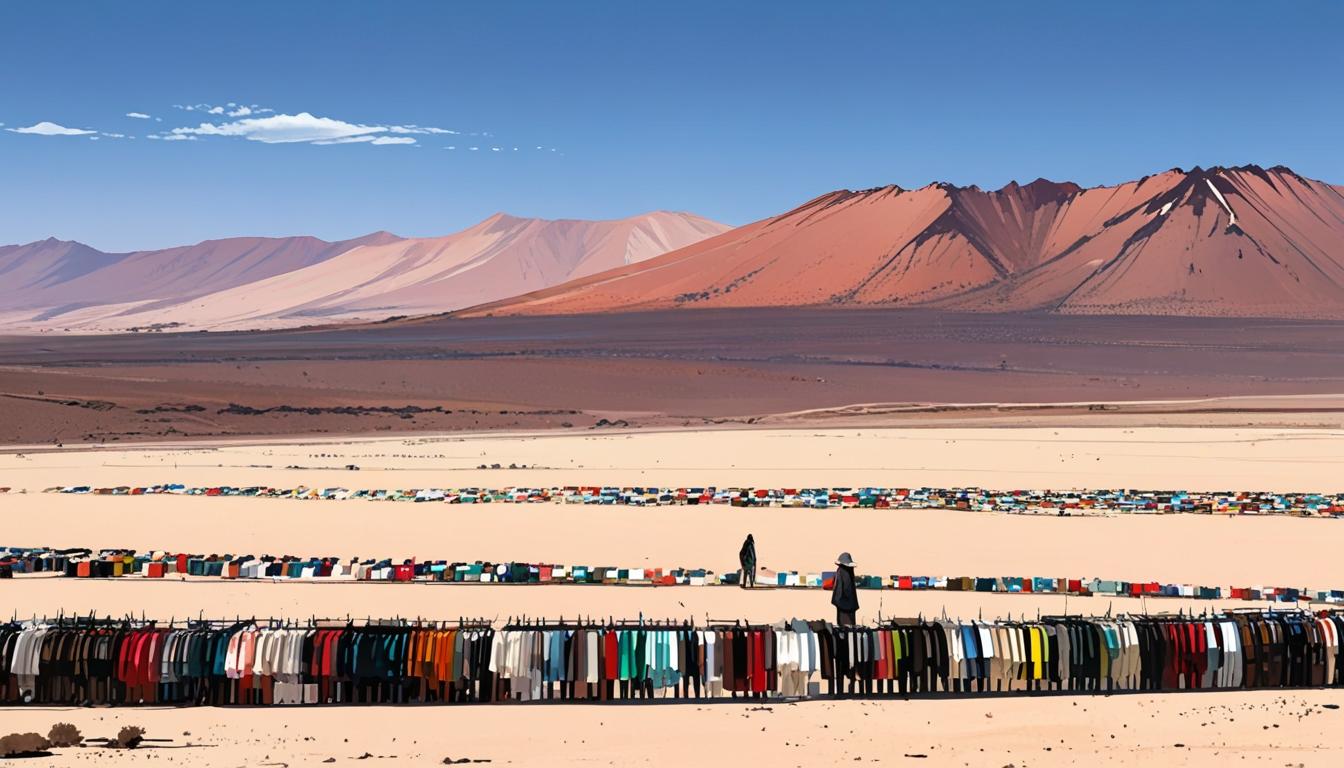As Bastián Barria embarks on an initiative to reclaim discarded clothing in Chile’s Atacama Desert, he raises awareness about the global crisis of textile waste and advocates for sustainable fashion practices.
Every week, Bastián Barria ventures into the Atacama Desert in northern Chile to collect discarded clothing items scattered across the sands. His efforts often yield hundreds of garments, many of which are in pristine condition. These findings, including notable brands like Nike, Adidas, and Calvin Klein, have led to the storage of approximately two tonnes of clothing at a friend’s residence.
On March 17, Barria, who is a civil engineer and co-founder of Desierto Vestido (Dressed Desert), launched the initiative known as Re-commerce Atacama, aimed at raising awareness about textile waste in Chile and beyond. In an unprecedented move, 300 items from his collection were made available for sale online. The garments were offered for free, with customers only responsible for shipping costs. The response was immediate and overwhelming; the first batch sold out within five hours, attracting buyers from various countries, including Brazil, China, France, the United States, and the United Kingdom.
Bastián Barria emphasized the intent behind the initiative, explaining, “We want people to feel involved and be agents of change – not from a passive position of seeing content, but by purchasing something, showing people and telling our story of what is happening here in the desert.” He noted his initial disbelief at the vast amounts of perfectly wearable clothing being discarded in the desert, underscoring the emotional weight of witnessing such waste.
Chile has long been a destination for secondhand and unsold clothing, primarily sourced from markets in countries like China and Bangladesh before arriving in Chile, often after transiting through Europe, Asia, or the United States. In 2022 alone, the country received over 131,000 tonnes of clothing, with the majority coming through Iquique, a significant duty-free port. However, it is reported that up to 70% of these textiles ultimately end up in rubbish dumps across the desert each year. Chilean regulations prohibit the disposal of textile waste in legal landfills due to concerns over soil stability, resulting in unsightly and hazardous waste accumulations in the desert.
As the Atacama Desert draws numerous tourists for its unique landscapes, the environmental impact of clothing waste has raised significant concerns among local communities. The sight of vast mountains of discarded clothes, as captured in satellite images, sparked discussion and further scrutiny earlier in 2023. In some cases, residents have resorted to burning the garments, compounding local air quality issues and health risks.
In response to this ongoing crisis, Barria’s organization partnered with Fashion Revolution Brazil, the Brazilian advertising agency Artplan, and the digital commerce platform Vtex to amplify the message. The Re-commerce Atacama initiative carefully selects and cleans the garments to prepare them for resale, maintaining a commitment to quality.
Moreover, the first clothing drop garnered attention from influencers and public figures, including Dudu Bertholini, a judge on Drag Race Brasil, who utilized social media to promote the campaign. The next opportunity for consumers to engage in this initiative is slated for April, with interested buyers able to sign up for notifications regarding future drops.
Fernanda Simon, the director of Fashion Revolution Brazil, described the project as “an act of activism that reveals what is behind fashion and proves we can do things differently.” Simon highlighted the pressing need for change in the fashion model, stating, “We must talk about circularity” and the necessity of instilling sustainability into clothing production practices.
The global textile industry generates approximately 92 million tonnes of waste annually, equating to a landfill’s worth of clothing every second. This systemic issue is largely attributed to heightened consumer demand and the fast-paced production cycles prevalent in modern fashion. Simon pointed out that where once four collections per year was the norm, some brands now launch as many as 52 collections annually.
Transforming unsold inventory and unwanted secondhand clothes into pollution in countries of the global south exacerbates the problem. The discourse parallels similar situations observed in Accra, Ghana, adding a broader perspective to this worldwide concern. Simon characterized the practice of dumping unsold clothing in low-income nations as “racist and colonialist,” noting how these dynamics perpetuate inequalities in the fashion industry.
The call for a global re-examination of the fashion system highlights the urgent need for sustainable alternatives and a greater understanding of the consequences of textile waste, a challenge that extends well beyond Chile’s borders.
Source: Noah Wire Services




